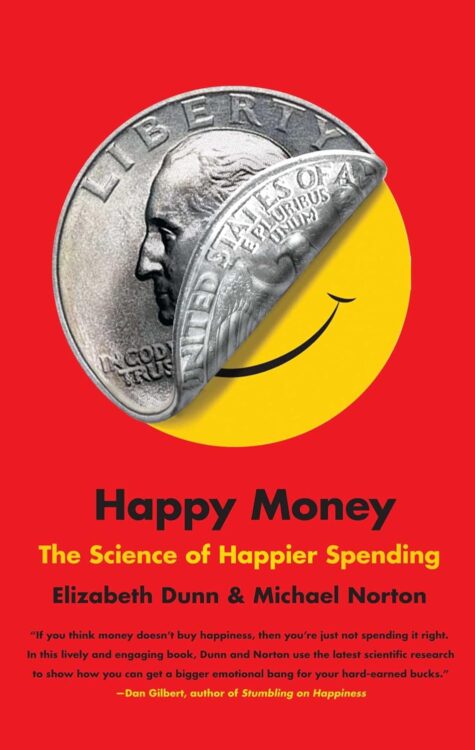Publisher’s Summary
Most people carefully plan how to earn, save, and invest their money, but when it comes to spending, they often rely on intuition. Happy Money explores the science behind spending habits and how to maximize happiness through financial choices. The authors outline five key principles—such as prioritizing experiences over material goods and spending on others—to help individuals and businesses make more fulfilling financial decisions. Backed by research, the book offers surprising insights, like why luxury cars may not bring more joy than economy models and how commercials can enhance TV-watching experiences.
Standout Quotes
“When people focus on their time rather than their money, they act like scientists of happiness, choosing activities that promote their well-being.”
“At the same time that money increases our happiness by giving us access to all kinds of wonderful things, knowing we have access to wonderful things undermines our happiness by reducing our tendency to appreciate life’s small joys.”
“Like a grapefruit diet, adopting an attitude of gratitude is easy at first but quickly becomes almost impossible. Because novelty captures our attention, we feel buoyantly grateful for things that catch us by surprise.”
What Readers Are Saying
Customers praise Happy Money for its insightful, research-backed approach to spending. Many describe the writing as clear and easy to understand, with practical advice on budgeting and investing in happiness. Readers appreciate the book’s fresh perspective on financial well-being and its convincing arguments about how spending choices shape overall satisfaction. — AI-generated from the text of Amazon customer reviews
My Take
This book was an entertaining read, packed with research and thought-provoking insights. A couple of things that stood out to me:
- Researchers use the “U-index” to measure how often people feel unpleasant emotions like tension, depression, or irritation. Interestingly, television ranks as one of the worst leisure activities in terms of U-index. A massive study of over 100,000 people across 32 countries found that those who watch more than 30 minutes of TV daily are statistically less happy. (Social media probably fares even worse, though this wasn’t studied.)
- I’ve always believed that anticipation boosts happiness, but I struggled to find proof—until this book! It turns out that anticipating positive experiences activates the brain’s pleasure center, the nucleus accumbens. A 2009 study in Belgium had participants spend a few minutes each evening imagining good things that might happen the next day—something as simple as eating fries at a café. After two weeks, they showed a significant increase in overall happiness.
Key Takeaways
If you want to get the most happiness from your money:
- Spend on experiences, not things, but maximize the impact by ensuring they:
- Foster social connection.
- Create memorable stories you’ll enjoy retelling.
- Align with your identity and aspirations.
- Offer unique, incomparable opportunities.
Final Verdict
Happy Money is an insightful, research-backed guide to making smarter spending choices. If you’re curious about the intersection of money and happiness, this book is well worth the read!
Bibliographic Details
Dunn, Elizabeth, and Michael Norton. Happy Money: The Science of Happier Spending. Reprint edition. Simon & Schuster, 2013.

